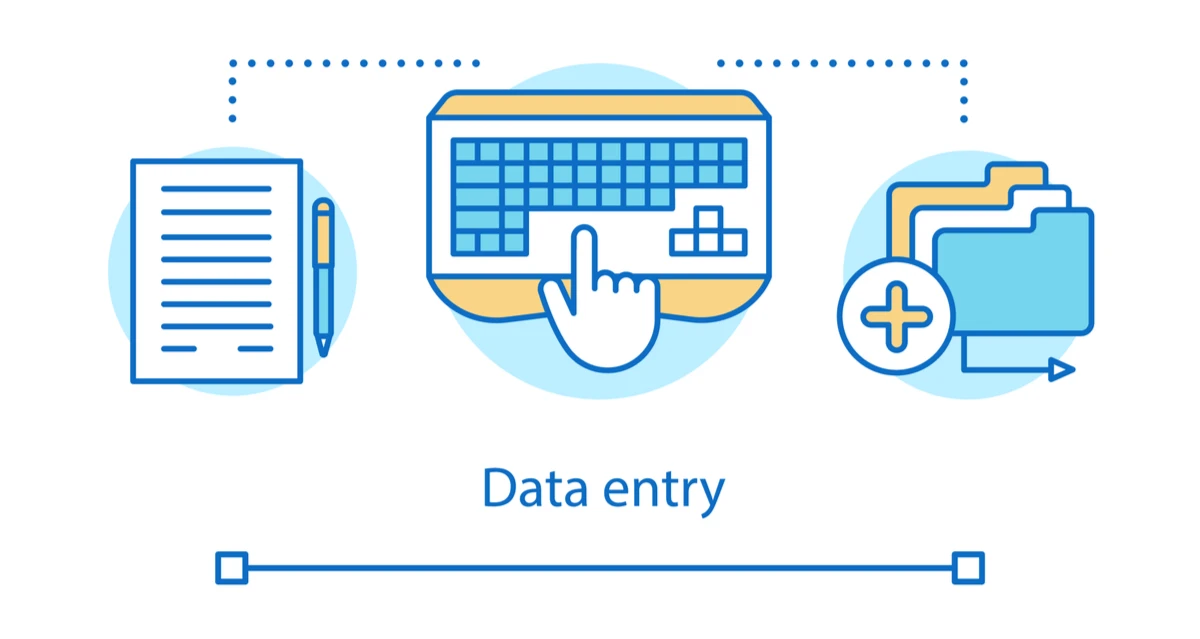Table of Contents
The practice of data entry outsourcing has gained traction as a viable business strategy, offering a multitude of benefits. If your company is still burdened by managing business data in-house, the following advantages may convince you to consider outsourcing data entry.
Data entry is labor-intensive and diverts focus from your primary objective: business expansion. By investing in outsourcing data entry services, you can save valuable time, alleviate stress, boost your bottom line, resolve data entry challenges, elevate data quality, and expedite project completion times.
This shows you how to save time and reduce stress by outsourcing manual data entry.
What Is Manual Data Entry?

Manual data entry is an old practice of documenting information for duplication and safekeeping that a data entry specialist usually executes. Performing this task is relatively simple and requires little effort. But its repetitive nature is the main reason it has a high turnover rate.
Companies still require manual data entry, but many have found a way to prevent their productivity from being jeopardized. Many organizations are choosing data entry outsourcing and coordinating with BPO companies to arrange a team of data specialists who are up for the work.
Businesses that choose to outsource manual data entry to BPO companies perform this task without compromising the productivity of their in-house team. The typing speed of a data entry specialist should at least be 45 words per minute. Companies that outsource manual data entry can tackle large volumes of data in a short time.
Why Do Companies Outsource Manual Data Entry?

The primary aim for companies choosing to outsource data entry services is to save both time and money, all while upholding the accuracy and integrity of their data. BPO firms, often ranked among the best data entry service providers, are specialists in back-office tasks like data entry. They bring a wealth of expertise, knowledge, and the necessary tools to ensure error-free data encoding.
Accurate data encoding cannot be overstated, as it enables businesses to make well-informed decisions. Inaccurate data can cost companies a staggering sum, exceeding $3 trillion.
When faced with data inaccuracies, both time and money are wasted in corrections and edits. That’s why many companies outsource manual data entry to maintain data quality. Businesses can focus more on core functions and other high-value activities by entrusting data entry tasks to a third-party provider.
How Do I Improve Scalability When I Outsource Manual Data Entry?
Digitization is not a final destination but rather a continuous improvement. That said, your data entry management and approach must be flexible and adaptable to meet the changing market needs and continue expanding your business.
Constantly recruiting new staff to address your evolving data challenges is almost impossible. Getting a new hire to reach full productivity and up to speed with your processes takes about eight months on average. It’s a risky and costly endeavor, and in-house data entry teams simply fall short in terms of scalability.
However, when you outsource manual data entry, you can transfer the burden to your third-party provider. You can also tap into a trained and managed workforce that can guarantee accountability and scalability.
How Does Outsourced Manual Data Entry Relieve the Stress of My Full-time Employees?
Processing large volumes of information requires a substantial team. Plus, managing training and staffing can be burdensome to most companies.
Outsourced data entry allows you and your staff to hand over the daily management of data and encoding infrastructure. When you outsource manual data entry, your staff can set it and forget it, assured that a reliable team of data specialists is aware of all your needs.
How Do I Reduce Project Turnover Time When I Outsource Manual Data Entry?
You must never rush data entry work and compromise quality control, especially for medical or legal cases that require sensitive transcription. But promptness is also crucial, especially when the data in question can offer immediate value to your business.
Chances are that your internal employees already have enough work to accomplish and commitments to address. Overburdened staff can quickly burn out, which might increase your turnover rate. This is true, especially if you take their time away from their core responsibilities.
On top of that, internal staff works only during typical business hours. Making them work overtime to manage data entry activities can be expensive.
Most BPO companies have enough staff to accommodate a 24/7 work schedule. When you outsource manual data entry to a BPO company, you have your work processed while you and your employees are busy on other matters. An excellent external data entry provider can reduce project turnover time without sacrificing quality by addressing the challenges of speed and scale.
How Do I Solve Encoding Issues When I Outsource Manual Data Entry?
Although encoding data is almost always associated with cumbersome work that is better off automated, there are instances where edge cases occur. And when they do, you need to have a team who will moderate and regulate the situation.
Automation has become more advanced than it can take over most routine encoding tasks with limited human intervention, but an error rate often accompanies it. Good OCR accuracy is defined as having a CER of 1-2% (i.e., 98-99% accurate) for printed text. Average OCR accuracy falls within a CER of 2-10%, and poor OCR accuracy has a CER greater than 10% (i.e., below 90% accurate).
While automation can help determine any potential data transcription and entry problem using an exception-monitoring algorithm, it still requires some human intervention to make changes manually. Your in-house team might take a long time correcting the errors or, worse, overlook them.
An excellent outsourced data entry service will use a mix of automation technology and people. When you outsource manual data entry to experts, you can mitigate edge cases efficiently and quickly, without leaving anything to chance.
How Do I Improve Data Quality When I Outsource Data Entry?
Data entry may seem like a low-skill task; however, the quality and consistency of your data entry across various sets of data are critical. Your digitization project will fail if your digitized information contains inconsistencies and errors, leaving your digitization initiative good for nothing. In certain industries such as finance and healthcare, the quality of data can make or break a business.
Although your in-house employees possess industry-specific skills to perform data entry, it does not mean they should. For example, there is a much better use for a paralegal than manually encoding legal records.
This is one of the reasons why companies outsource data entry services. Keeping encoding tasks in-house often lacks accountability and oversight, which can affect the integrity of your data.
How Do You Outsource Manual Data Entry?

When you outsource manual data entry, you hire a third-party vendor specializing in the said function to oversee your encoding activities on your behalf. Outsourcing data entry can include encoding jobs such as:
- Forms processing and other offline data entry services
- Transcription of handwritten notes
- Invoice data entry
- Expense data entry
- Claims data entry
- Image data entry
- Document management service
- Filling in spreadsheets for back-office functions
- Product data entry
- Survey data entry
- Conversion of raw data and data input
There are two ways companies can outsource manual data entry:
Onshore Outsourcing
Onshore outsourcing refers to hiring service providers within your home country, whether on-site or remote. It is often easier to collaborate and communicate when you outsource domestically, but the costs are usually higher.
Offshore Outsourcing
Offshoring is when you hire a BPO company based in a foreign company such as the Philippines to manage your data entry work. Offshore outsourcing is usually cheaper than onshoring due to low labor costs; however, collaboration problems might arise if not done properly.
When Should You Outsource Manual Data Entry?

Data entry tasks should not encumber your core business. It also shouldn’t burden your employees, whose attention should be focused on other activities.
However, it is also not practical to create a dedicated team of in-house employees to handle data entry. Luckily, you have the opportunity to convert your data into valuable assets when you outsource manual data entry.
Back-office outsourcing offers the best bang for your buck when you have big piles of audio or text content waiting to be enriched, cleaned up, transcribed, and digitized. This is often the case for established companies with large amounts of records in legacy and printed formats. For instance, digitizing archived records in the legal sector can help simplify legal contract review and electronic discovery.
The Bottom Line
When you outsource data entry to a reliable BPO provider, the result is accurate, timely, and high-quality data entry services because a highly trained encoder enters your data. Equipped with the best encoding techniques and skills, you can guarantee a quick turnaround time for your data entry project without compromising integrity.
If you want to focus on core competencies, reduce expenses, boost productivity, and enhance reliability and security, consider outsourcing your manual data entry today. For more insights on optimizing data entry processes, we invite you to read our article on the 20 Best Data Entry Service Providers.




